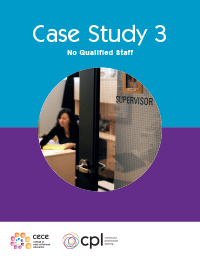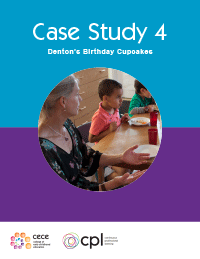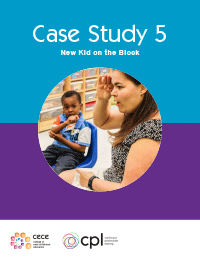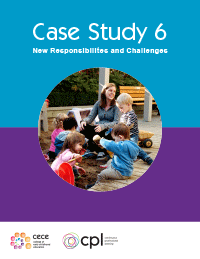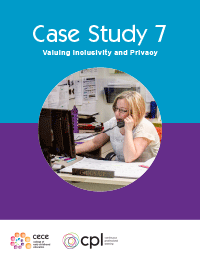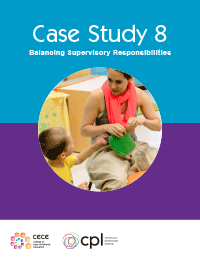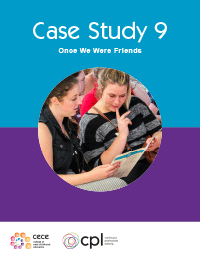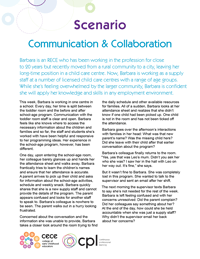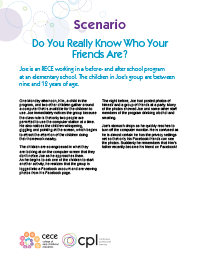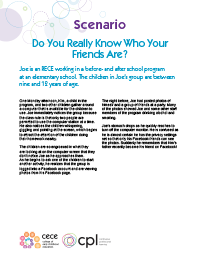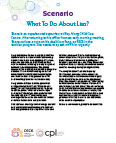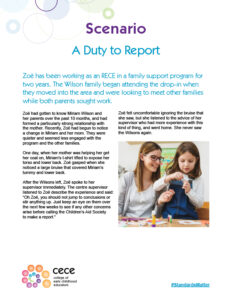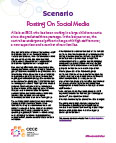Case Studies and Scenarios
Case Studies
Each case study describes the real experience of a Registered Early Childhood Educator. Each one profiles a professional dilemma, incorporates participants with multiple perspectives and explores ethical complexities. Case studies may be used as a source for reflection and dialogue about RECE practice within the framework of the Code of Ethics and Standards of Practice.
Scenarios
Scenarios are snapshots of experiences in the professional practice of a Registered Early Childhood Educator. Each scenario includes a series of questions meant to help RECEs reflect on the situation.
Case Studies
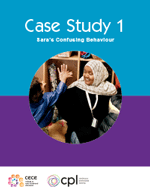 Case Study 1: Sara’s Confusing Behaviour
Case Study 1: Sara’s Confusing Behaviour
An RECE discovers that Sara, a senior staff member and her preschool room partner, has been posting hateful opinions on social media. This causes the RECE to question how Sara’s opinions have not only affected their professional relationship, but also the relationship with other staff members and, ultimately, the children in the preschool room.
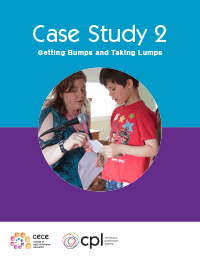 Case Study 2: Getting Bumps and Taking Lumps
Case Study 2: Getting Bumps and Taking Lumps
Jake, a child with multiple cognitive and social challenges, often finds the busy nature of the classroom stressful. During his time away from the other children, he lashes out at a classmate he had allowed into his play space. The child ends up with a bump above his eye. When the father comes to pick up the child, he’s very angry and shouts at the RECE, demanding to know the name of the child who hurt his son.
 Case Study 3: No Qualified Staff
Case Study 3: No Qualified Staff
An RECE disagrees with her new supervisor, Polly, who has given another colleague permission to leave early. Scheduled to leave at 3 p.m. that day, the RECE is now obligated to stay until the other qualified RECE returns from accompanying older students on a field trip. Having a qualified RECE on the premises at all times with the children is not only legislation, but also a policy of the child care centre.
 Case Study 4: Denton’s Birthday Cupcakes
Case Study 4: Denton’s Birthday Cupcakes
Denton brings cupcakes to celebrate his recent birthday with his preschool classmates. The cupcakes are handed out during the lunch period. Shortly after lunch, Mika, who happens to have a nut allergy, complains of a stomach ache. As panic sets in for the staff, it’s discovered that they failed to look at the label before handing them out to the children.
 Case Study 5: New Kid on the Block
Case Study 5: New Kid on the Block
A new RECE starts a job at the child care centre she was assigned to for her student placement. As she settles into her new role, she notices that the culture of the centre is toxic. The other staff pawn off their unwanted duties to her such as changing diapers, getting the kids ready to go outside to play and dealing with families that staff say are difficult. The new RECE is finding it difficult to be enthusiastic about her job and is questioning the values she learned about in school.
 Case Study 6: New Responsibilities and Challenges
Case Study 6: New Responsibilities and Challenges
Janet is a new supervisor at a child care centre and, in her first few weeks, she receives numerous complaints about a specific RECE. While getting to know the different personalities of the staff, Janet does some digging into the personnel files and discovers performance appraisals haven’t been carried out in several years. After investigating two separate incidents involving the same RECE, she decides to present a letter of discipline to the staff member.
 Case Study 7: Valuing Inclusivity and Privacy
Case Study 7: Valuing Inclusivity and Privacy
A centre supervisor is helping with the transition of a child whose family is new to the area. She finds out that one of her staff members asked the family for their schedule; a piece of information that the centre does not actually require. It turns out that the staff member is discriminating against families who receive fee assistance. The supervisor wonders how many other families receiving subsidized child care have been asked to provide unnecessary information and if any of the other staff at the centre share the same view.
 Case Study 8: Balancing Supervisory Responsibilities
Case Study 8: Balancing Supervisory Responsibilities
A preschool supervisor hires an RECE to support a child who is new to the centre and requires a dedicated staff member. When the child runs away after outdoor play time, the RECE doesn’t help to locate the child whereas all other staff jump in to assist. As the supervisor completes the incident report and arranges for a review of the plan to keep the child safe, she receives an unsettling phone call from the new RECE’s father who is angry about a staff meeting that went late.
 Case Study 9: Once We Were Friends
Case Study 9: Once We Were Friends
An RECE goes back to a child care centre he used to work for, but this time as the supervisor. He used to be friends with one of the other RECEs, Jamie, who is now expecting special treatment since they are friends. When the supervisor does not give in to Jamie, she starts lashing out when he tries to make some positive changes for the centre. It becomes clear that the supervisor needs to address the issues with Jamie’s behaviour, especially after she makes an angry phone call to another staff member in an area where some of the children may have overheard what she was saying.
Scenarios
 Communication and Collaboration
Communication and Collaboration
Barbara, an RECE, is working as a supply staff at various centres across the city. During her week at a centre where she helps out in two different rooms each day, she finds that her experience in the school-age program isn’t as straightforward as when she was in the toddler room. Barbara feels completely lost in this program.
 Do You Really Know Who Your Friends Are?
Do You Really Know Who Your Friends Are?
Joe is an RECE at an elementary school and works with children between the ages of nine and 12 years old. One afternoon, he finds a group of children huddled around the computer giggling and whispering. Joe quickly discovers they’re going through his party photos on Facebook as one of the children’s parents recently added him as a friend.
 Conflicting Approaches
Conflicting Approaches
Amina, an experienced RECE, has recently started a new position with a child care centre. She’s assigned to work in the infant room with two colleagues who have worked in the room together for ten years. As Amina settles into her new role, she is taken aback by some of the child care approaches taken by her colleagues.
 What to do about Lisa?
What to do about Lisa?
Shane, an experienced supervisor at a child care centre, receives a complaint about an RECE who had roughly handled a child earlier that day. The interaction had been witnessed by a parent who confronted the RECE. After some words were exchanged, the RECE left in tears.
 Duty to Report
Duty to Report
Zoë works as an RECE in a drop-in program at a family support centre. She has a great rapport for a family over a 10-month period and beings to notice a change in the mom and child. One day, as the child is getting dressed to go home for the day, she notices something alarming and brings it to the attention of her supervisor.
 Posting on Social Media
Posting on Social Media
Allie, an RECE who has worked at the same child care centre for the last three years, recently started a private social media group to collaborate and discuss programming ideas. As the group takes a negative turn with rude and offensive comments, it’s brought to her supervisor’s attention.
